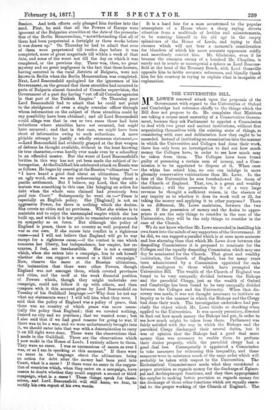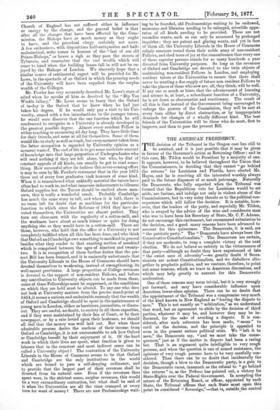THE UNIVERSITIES BILL.
MR. LOWE'S renewed attack upon the proposals of the Government with regard to the Universities of Oxford and Cambridge had reference chiefly to the things which the Bill does not propose to do. He complains that Ministers are taking a course most unworthy of a Conservative Govern- ment, because they ask Parliament to appoint a Commission to deal with two great and ancient institutions, without first acquainting themselves with the existing state of things, or considering with care and deliberation how they ought to be amended. Instead of instituting an examination into the manner in which the Universities and Colleges had done their work, there has only been an investigation to find out how much money the Colleges have, in order to see how much may be taken from them. The Colleges have been found guilty of possessing a certain sum of money, and a Com- mission is to be appointed to dispose of it. When once the whim has seized him, no one can indulge in more gloomily conservative vatieinations than Mr. Lowe. In the fate of the Universities he sees foreshadowed the doom of the Church of England. That, too, is a great and wealthy institution ; will the possession by it of a very large revenue be thought a sufficient reason, in the absence of any inquiry as to whether it does its work well or ill, for taking the money and applying it to other purposes? There is no difference, Mr. Lowe maintains, between the two cases. If the possession of money and the desire to appro- priate it are the only things to consider in the case of the Universities, they will be the only things to consider in the case of the Church.
We do not know whether Mr. Lowe succeeded in instilling NB own fears into the minds of any supporters of the Government. If he did, we can suggest a parallel which is at ones more accurate and less alarming than that which Mr. Lowe drew between the despoiling Commissions it is proposed to nominate for the Colleges and the equally despoiling Commission which may one day be nominated for the Church. That great and wealthy institution, the Church of England, has for many years been administered by a Commission appointed for ends closely, analogous to those which have prompted the Universities Bill. The wealth of the Church of England was found to be very unequally divided between the Bishops and the parochial Clergy, just as the wealth of Oxford and Cambridge has been found to be very unequally divided between the Colleges and the University. When that dis- covery was made, it was not thought necessary to institute an inquiry as to the manner in which the Bishops and the Clergy had done their work. The investigation undertaken had pre- cisely the object which Mr. Lowe thinks so shocking when applied to the Universities. It was merely pecuniary, directed to find out how much money the Bishops had got, in order. to see how much might be taken from them. Parliament was fairly satisfied with the way in which the Bishops and the parochial Clergy discharged their several duties, but it was of opinion that the Bishops had a good deal more money than was necessary to enable them to perform their duties properly, while the parochial clergy had a good deal less. Consequently it appointed a Coniraission to take measures for redressing this inequality, and these measures were in substance much of the same order which will probably be taken with respect to the Universities. The Ecclesiastical Commissioners made what they considered a proper provision as regards money for the discharge of Epise,o. pal and Archiepiscopal functions, and they then appropriated the surplus to making better provision as regards money-for j.the discharge of those other functions which are equally men- Nal to the proper working, of the Church of England. The
Church of England has not suffered either in influence or energy by the change, and the general belief is that after all the changes that have been effected by the Com- mission, the Bishops have as much money as they ought to have, and the parochial clergy certainly not more. A few enthusiasts, with dispositions half-antiquarian and half- ecclesiastical, write verses in honour of the "last of our old Prince-Bishops," or heave a sigh as they pace the streets of Tyburnia, and remember that the vast wealth which will come to hand when the building leases fall in will not be en- joyed by the Bishops of London. We sincerely hope that a similar source of sentimental regret will be provided for Mr. Lowe, in the spectacle of an Oxford in which the pressing needs of the University will have been supplied from the surplus wealth of the Colleges.
Mr. Fowler has very accurately described Mr. Lowe's state of mind when he speaks of him as deceived by the "Rip Van Winkle fallacy." Mr. Lowe seems to fancy that the Oxford of to-day is the Oxford that he knew when he had just taken his degree. If he would only pay a visit to his Uni- versity, armed with a few introductions to the younger tutors, he would soon discover that the one function which he will condescend to recognise in a University is already developed in the greatest possible degree. Almost every resident Fellow is either teaching or examining all day long. They have little time for their friends, and none at all for themselves. Some of them would like to study as well as teach, but everymoment taken from the latter occupation is regarded by University opinion as a moment wasted. The end of life is to get some moderate amount of knowledge into that large proportion of Undergraduates who will read nothing if they are left alone, but who, by dint of constant appeals of all kinds, can usually be got to read some- thing. How successful after its fashion this never-ceasing effort is may be seen by Mr. Fowler's statement that in the year 1875 three out of every four graduates took honours of some kind. When it is remembered what unkindly material the tutors have often had to work in, and what immense inducements to idleness Oxford supplies lest the Tutors should be exalted above mea- sure, this is really a wonderful result. Probably Cambridge has much the same story to tell, and when it is told, there is no room left for doubt that as machines for the particular function to which since the Reforms of 1854 they have de-
voted themselves, the Universities are almost perfect. They turn out class-men with the regularity of a cotton-mill, and the workmen have about as much leisure or quiet for doing anything else as they would have in a cotton-mill. There are those, however, who hold that the office of a University is not completely fulfilled when all this has been done, and who think that Oxford and Cambridge owe something to mankind in general besides what they render to that exacting section of mankind which is comprised between the ages of nineteen and twenty- two. It is in recognition of these further duties that the pre- sent Bill has been framed, and it is eminently unfortunate that the University Liberals in the House of Commons should have devoted themselves to weakening, instead of stiengthening, its well-meant provisions. A large proportion of College revenues is devoted to the support of non-resident Fellows, and before any contribution to University objects can be made from these, some of these Fellowships must be suppressed, or the conditions on which they are held must be altered. To any one who does not look at University matters from the precise stand-point of 1854, it seems a curious and undesirable anomaly that the wealth of Oxford and Cambridge should be spent in the maintenance of young men in London, either as barristers, journalists, or diners- out. They are useful, no doubt, to society in all these capacities, and if they were maintained by their Inn of Court, or by their newspaper, or by a rate levied upon their hostesses, we should all feel that the money was well laid out. But when these admirable persons derive the nucleus of their income from Oxford or Cambridge, it is not unreasonable to ask how Oxford or Cambridge benefit by their enjoyment of it. Of the hard work in which their lives are spent, what fraction is given to labours that in the remotest and most indirect sense can be called a University object The contention of the University Liberals in the House of Commons seems to be that Oxford and Cambridge are the only institutions in the world which are bound to pass a self-denying ordinance, and to provide that the largest part of their revenues shall be diverted from its natural uses. Even if the revenues thus spent were, in the strictest sense, surplus revenues, this would be a very extraordinary contention, but what shall be said of it when the Universities are all the time cramped at every turn for want of money? There are new Professorships wait-
ing to be founded, old Professorships waiting to be endowed, museums and libraries needing to be enlarged, scientific appa- ratus of all kinds needing to be provided. These are not recondite wants, such as can only be measured by prolonged inquiries ; they are patent and glaring wants, and yet in face of them all, the University Liberals in the House of Commons calmly summon round them their noble army of non-resident Fellows, and shed tears of joy at the remembrance that every one of these superior persons stands for so many hundreds a year diverted from University purposes. So long as the revenues of Oxford and Cambridge are devoted to the twin objects of maintaining non-resident Fellows in London, and employing resident tutors at the Universities to ensure that there shall never be wanting a due supply of future non -resident Fellows to take the places of those who now are, all, they think, will be well. If any one so much as hints that the advancement of learning and science is, at least, a subordinate function of a University, he is set down as obscurantist and reactionary. The result of all this is that instead of the Government being encouraged to enlarge the powers of the Commission, they will be met at every turn either by direct obstruction, or by inappropriate demands for changes of a wholly different kind. The best friends of the Universities will be those who do most, first to improve, and then to pass the present Bill.



































 Previous page
Previous page